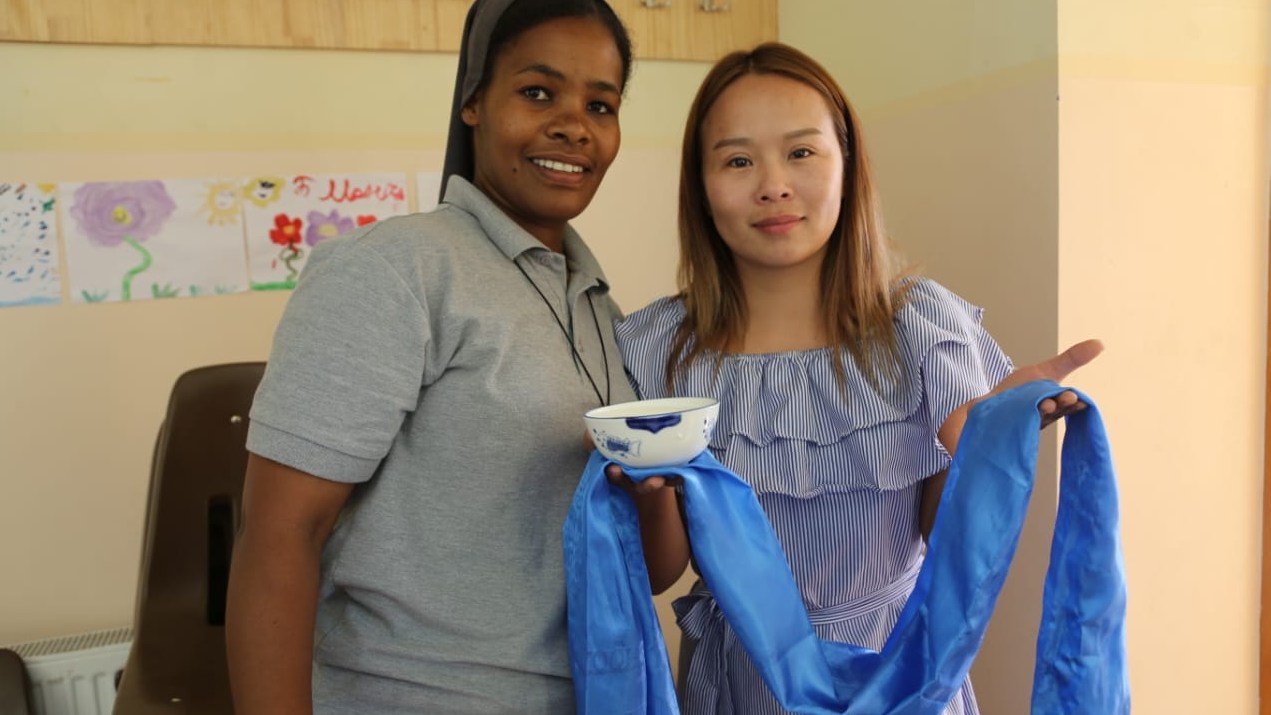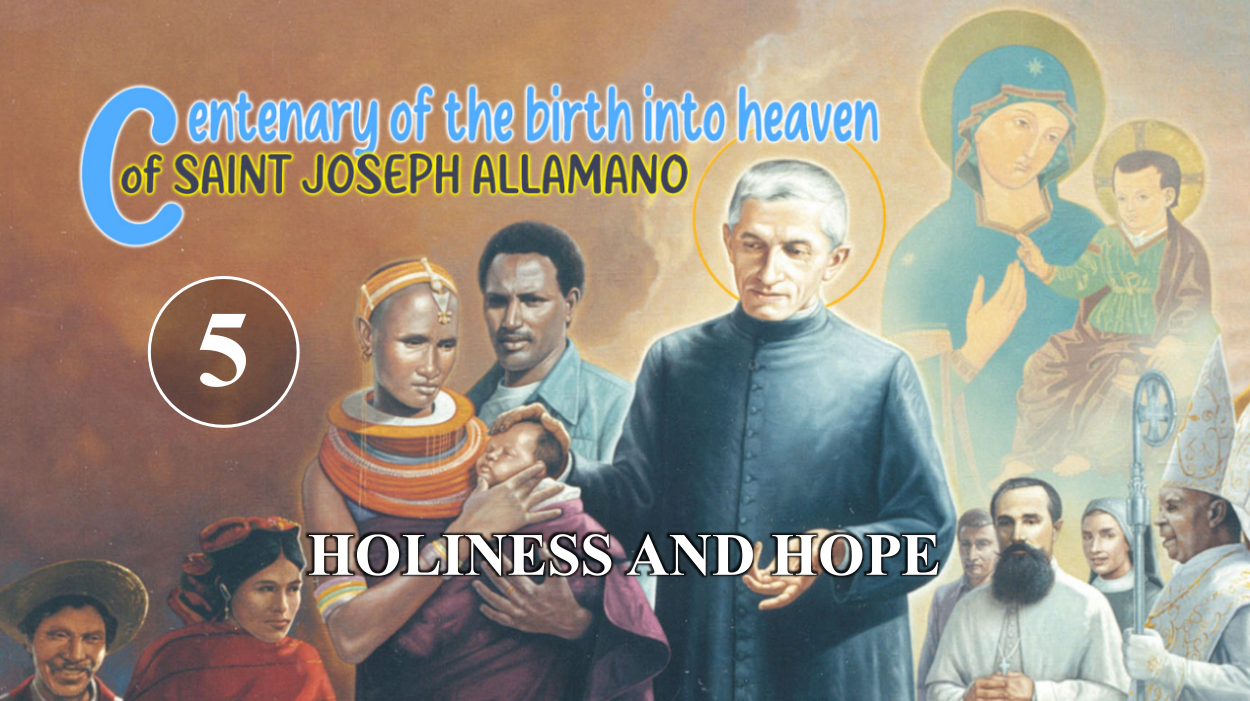I am Sr. Tireza Gebriel from Ethiopia, born in 1984. I made my first profession on March 28, 2016, in Kenya (Nazareth). Then I received my first destination in Asia, specifically in Mongolia, in April 2018, and I have been serving the Lord in Mongolia ever since. I would like to share my experience of joy in my mission, connecting it to the vocation of Abraham, which inspires me to contemplate my life in mission. It is a journey of faith towards the Promised Land. God said to Abraham: “Leave your country, your people, and your father’s household, and go to the land I will show you.” The voice of God comes to each person in different ways, making us aware of His presence. The journey of faith requires encountering God and surrendering to Him. Why does God call us and ask us to leave behind our country, culture, language, and to go to new people who may not know Him or are non-Christians? The call of God is free, sovereign, and moved by the Spirit of love for humanity. But it is also very demanding and requires detachment. The love of God, beyond everything, wins the hearts of humanity by making us abandon ourselves to do His will. Responding to God’s call involves an encounter between two persons. It is a time to welcome grace into my life and to trust more in Him. God loves me as I am. He is merciful despite all my weaknesses. When there is communion with God, there is light and joy. I continue to contemplate God’s creation, made through His Word: “God saw that all He had made was very good” (Gen 1:31). There is always a beginning in our lives. God gives us names and calls us by name. Even today, God calls us by our name and entrusts us with His mission. Abraham was called and sent; his name was changed to “father of faith.” Abraham experienced deep intimacy with God and a listening heart. When God touches our hearts, everything changes in our lives. I have been challenged to understand my inner voice and the voice of God. It’s not easy to describe. If I am silent, does it mean there is peace within me? Can inner silence help me understand the noise of the outside world? When I face challenges, my inner voice often remains confused, and I feel emptiness. Sometimes I have no words, just silence in front of the Tabernacle. I started searching for the One who called me, seeking to see His face. Opening the gate of my heart to Him, I feel that He is always near, even if I am not fully aware of His presence. When there is a relationship with God, there is peace; only God knows the inner path of my life. God journeyed with Abraham with an open heart until the very end. Where there is communion, there is transformation. God can transform us if we desire to sacrifice our lives. The mission of God requires total sacrifice and patience. Vocation is a gift from God, and a missionary vocation is a mystery. I often imagine: when Jesus came into this world, did He run away from challenges? Why did Jesus obey and give His life on the cross? Did the disciples follow Him because life was easy? Without suffering or sacrifice, there is no true life. It is a personal journey to welcome the grace and blessing of the mission. Challenges help us grow and open our hearts to new realities. Jesus experienced all the challenges of life—suffering and sacrifice—to fulfill. Sr. Tireza, mc
Holiness and hope
Towards the Centenary of the birth into Heaven of Saint Joseph Allamano, a new reflection about Saint Joseph Allamano, holiness and hope “Paul was a lonely fisherman who lived by the sea. After losing his wife, he had never gone fishing with his boat again. The days passed slowly, and it no longer made sense for him to sail the waves he loved so much. One winter night a strong storm hit the small village: the winds were howling, and the waves were like furious monsters. Paul looked at everything through the window, until, amid the lightning and thunder, he saw a small light flashing in the distance. It was the lighthouse that remained on, still, despite all the chaos that surrounded it. The next morning, he learned that a boat of young fishermen had been lost at sea and that it was the light of the lighthouse that had guided them to the shore. The next day, something changed. He cleaned his old boat, fixed the sails, and went fishing at sunset. Paul understood that, sometimes, hope is just that: a small light lit in the storm.” This little story helps us to understand that hope does not eliminate the storm, but indicates a way, it does not require great certainties, but only small steps towards certainty. In today’s world, surrounded by crisis and despair, hope is not a luxury, it is a vital necessity. And, like the lighthouse for sailors, it remains still, lit, inviting us to continue, even when all seems lost. The word hope carries within it a silent dynamism. In Latin, spes means “trustful waiting”, and is related to the verb sperare (to wait with confidence). In Greek, the corresponding word is elpís (ἐλπίς), which also refers to waiting, but with a more existential connotation: a trust turned to the future, often beyond the visible. Pope Francis, in this Jubilee Year, has invited us to live our faith as a journey, reminding us that Christian life is a continuous pilgrimage to God. Hope, in this context, is not simply optimism or desire for a better future, but a theological virtue based on the certainty that God is faithful to his promises: “May we who have taken refuge in him be strongly encouraged to seize the hope set before us. We have this hope, a sure and steadfast anchor of the soul, a hope that enters the inner shrine behind the curtain, where Jesus, a forerunner on our behalf, has entered.» (Heb 6:18-20). Those words are a forceful encouragement for us never to lose the hope we have been given, to hold fast to that hope and to find in God our refuge and our strength.” St. Joseph Cafasso, model of hope St. Joseph Allamano pointed out to his uncle Giuseppe Cafasso as a model of hope that all his missionaries had to follow: “He had so much hope that he also transmitted it to others. When someone told him that the gate of heaven is narrow, he immediately replied: “Oh yes? So let us enter one at a time! “He was able to instil hope even in those condemned to death, giving them messages to take to Our Lady; and after an execution, he exclaimed: “Here is another saint!” And he added: “Those scoundrels steal our heaven!” Therefore, we must hope, hope with all our might! Hope is not only an abstract theological virtue, but a concrete force that gives meaning and direction to life, even in the most dramatic situations, such as the approach of death. We are invited to live an active, contagious hope, full of trust in God’s love, that is, as missionaries, we are called to be sources of hope for others, even (or especially) when all seems lost. Trust: the purest hope In his spirituality, Joseph Allamano speaks to us of trust as the highest form of hope, its “quintessence”. The word “quintessence”, which derives from the Latin quinta essentia, suggests all that is purest, most essential: we must trust in God above our weaknesses, above our falls, above our human logic. There is in our lives an eternal conflict between doing nothing and the greatness of our missionary vocation but let us not be discouraged because this is a common experience among those who seek to live the Gospel authentically: they feel unworthy, incapable, discouraged. But the answer is not to give up, but rather to dive deeper into trust. A missionary without trust becomes “a torment for himself and for others”. Without trust there is no joy, and without joy there is no Gospel that can be transmitted. Trust is therefore not only a theological virtue, but an apostolic duty because it is contagious, generates peace and bears fruit: “I love very much a prayer about trust in God: one day I will bring it to you”. “I will never lose trust in You, my God. Oh, how beautiful it is!” This trust needs to be cultivated, nurtured and shared. Psalm 124 – “Those who trust in the Lord are like Mount Zion: it does not waver; it stands firm forever” – exhorts us to possess this firmness because it will be the foundation of our mission. Hope in Being a Missionary Hope profoundly transforms the life of the missionary, leading him to live with a new and paschal spirit, that is, to live in the light of Christ’s Easter, cultivating a new way of being, of thinking, of acting and of relating to God, to others and to history itself. Here are some of the challenges that St. Joseph Allamano presents to us, always anchored in hope: – To be new and Easter missionaries who live with a renewed perspective, without fear of history or the future, always open to the newness of the Risen One: “Do not say, ‘Who knows if I will be saved?’, but: «I want to be saved, and therefore I want to amend my defects and not be discouraged.»” – To be contemplative and poor
Novena to Our Lady Consolata. Nineth day.
CONSOLATION IS MISSION
Novena to Our Lady Consolata. Eighth day.
CONSOLATION IS WELCOME
Novena to Our Lady Consolata. Seventh Day
CONSOLATION IS SALVATION
Novena to Our Lady Consolata. Sixth Day
CONSOLATION IS JOY
Novena to Our Lady Consolata. Fifth Day
CONSOLATION IS HOPE
Novena to Our Lady Consolata. Fourth Day
CONSOLATION IS A SIGN
Novena to Our Lady Consolata. Third Day
CONSOLATION IS DIALOGIC, IT IS OFFERING
Novena to Our Lady Consolata. Second Day
CONSOLATION, A GIFT. HER GIFT TO US












